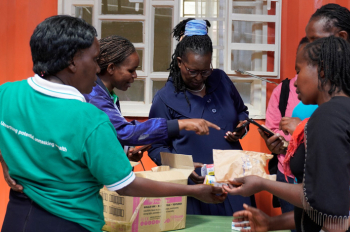
We are the most self-tracked, self-analyzed generation in history. You can monitor your VO2 max, sleep quality, habit streaks, macros, social media usage, heart rate, even how many breaths you take per minute.
We don’t just live our lives—we measure them, analyze them and compare them. Statistics show that gym use has skyrocketed, as has plastic surgery, and use of health apps. At the same time, other studies are showing an increase in church attendance, Bible sales and openness to spirituality. It makes me wonder: how do we disciple those who are coming to faith through the lens of self-improvement, those seeking to become the best them they can be and seeing church as part of that?
We should all consider how we help new believers in a world of self-obsession.
As this is the dominant narrative in our UK culture, and many others, this will be a discipleship issue within our churches whether we’re aware of it or not, so we should all consider how we help new believers in a world of self-obsession.
It’s worth saying that people have always come to Jesus with mixed motives. We see this throughout the gospels, people drawing close to Jesus for healing, to see a miracle, or because they’re drawn to a crowd. If you think back on your story, as I do mine, we all came to Jesus with all sorts of baggage and motives, and God met us in that place.
So this isn’t a new phenomenon. But the types of questions people are asking today, and the cultural assumptions behind them, have shifted. The water people are swimming in demands us to have an increased cultural awareness and to respond with intentional discipleship.
Faith can easily be reduced to just another self-help strategy.
In a self-obsessed culture, faith can easily be reduced to just another self-help strategy. Another thing to add to the list: drink more water, take more steps, read the Bible. It becomes about personal development, measurable results, emotions and convenience.
Faith stuck in this cultural story-line becomes something we curate, picking the parts of Jesus we like and ignoring the rest. Pasting the "live your truth" narrative onto the truth of scripture. It means that when you stop seeing the results we expect, when church becomes inconvenient, or you’re confronted with the cost of following Jesus, you try something new—maybe a new church, a new practice, or a totally new spirituality all together.
That’s why quality discipleship matters so much. The transformation that people long for, the flourishing they’re seeking, the life they desire, can’t be found in health, experience, or within themselves. It can only be found in Jesus.
The gospel does bring about transformation, but not on our own terms.
The gospel does bring about transformation, but not on our own terms. It’s not a self-help plan but a rescue plan, taking us from darkness to light, making us totally new creations. This transformation doesn’t come through our good habits or personal development. It comes through repentance and faith.
In a culture oriented around the self, new believers don’t need more self-help talks, quick fixes, or entertainment. They need the gospel. They need mature Christians walking alongside them, helping them discover who Jesus is, helping them see he’s worth giving up everything for—even attention on ourselves.
Discipleship isn’t about people becoming better, behaving better or living better. It’s about reorienting our lives around who God is. One of the most important pieces in our discipleship journeys today is about helping people think less of themselves and more of Christ.
Jo Frost and Peter Lynas explore this in more depth on the Being Human podcast, unpacking how to disciple effectively in light of the cultural narratives shaping our generation. You can watch that episode on YouTube now.
Originally published by Being Human. Republished with permission.
Katherine Brown joined the Evangelical Alliance UK in 2023 to be part of the Being Human team. Before this, she worked in student ministry, equipping students to share their faith with their friends. Katherine became a Christian while at drama school and she’s passionate about evangelism, storytelling and seeing young adults thrive in Church!
The Evangelical Alliance in the United Kingdom is made up of hundreds of organisations, thousands of churches and tens of thousands of individuals, joined together for the sake of the gospel. Representing our members since 1846, the Evangelical Alliance is the oldest and largest evangelical unity movement in the UK. United in mission and voice, we exist to serve and strengthen the work of the church in our communities and throughout society. Highlighting the significant opportunities and challenges facing the church today, we work together to resource Christians so that they are able to act upon their faith in Jesus, to speak up for the gospel, justice and freedom in their areas of influence.






